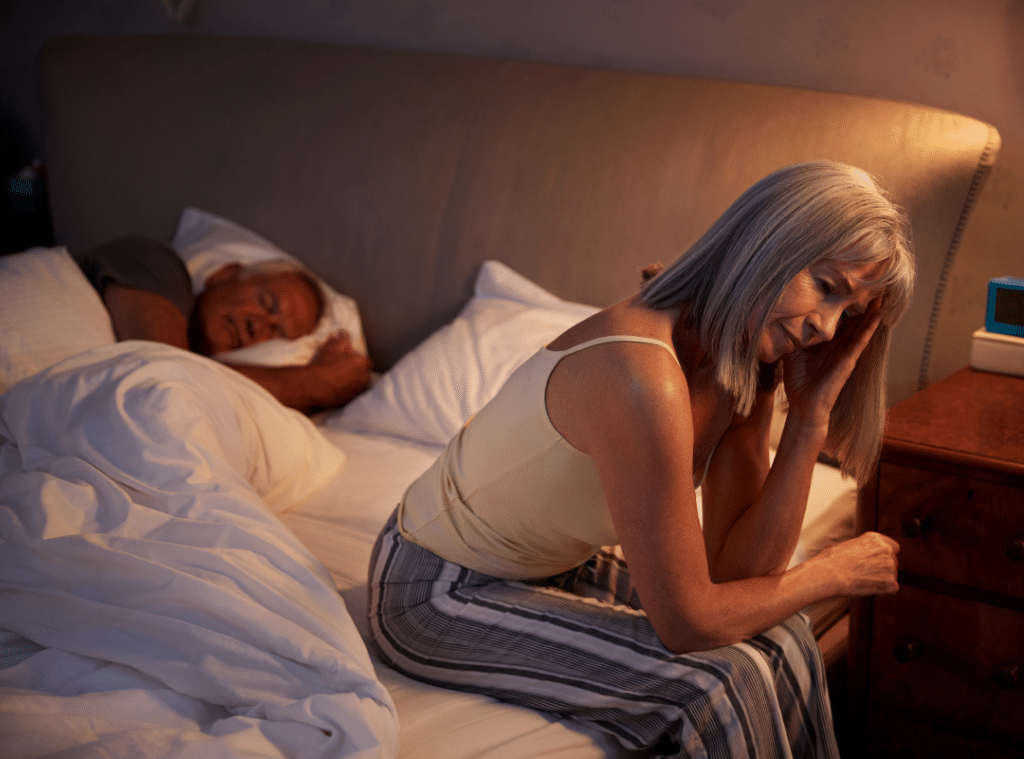Insomnia in Seniors: Causes, Effects, and Solutions
If you’re a senior struggling with insomnia in elderly women, you’re not alone. Many factors, including medical conditions and mental health issues, can disrupt sleep, leading to geriatric insomnia guidelines that emphasize proper sleep hygiene and treatment options. Understanding these causes is essential for finding practical solutions. At Westmont at San Miguel Ranch, we are committed to helping seniors reclaim restful nights and improve their overall well-being. So, what strategies can help you achieve better sleep? Let’s explore the landscape of sleep health for seniors together.
Overview of Insomnia in Seniors
Insomnia can feel like a relentless shadow for many seniors, casting doubt on their ability to enjoy restful nights. This condition manifests as persistent difficulty falling or staying asleep, often accompanied by excessive daytime sleepiness and cognitive impairments. The elderly, not sleeping for days, can experience severe consequences, including memory loss and a weakened immune system. As a caregiver, understanding natural remedies for insomnia in the elderly is essential. You can support better rest by promoting a comfortable sleep environment and encouraging healthy routines. Cognitive behavioral therapy can also effectively address negative thoughts and behaviors surrounding sleep. Recognizing insomnia’s impact allows for meaningful interventions that enhance well-being and daily functioning. Additionally, addressing underlying triggers of insomnia can further facilitate better sleep outcomes.
Factors Contributing to Insomnia
Various medical conditions can significantly impact your sleep quality as you age, making insomnia more prevalent. Additionally, changes in your circadian rhythm can disrupt your natural sleep-wake cycle, leading to further difficulties. Understanding these factors is essential for addressing the insomnia you might be experiencing. Furthermore, sleep patterns change with age, which can exacerbate the challenges faced by seniors in achieving restful sleep.
Medical Conditions Impacting Sleep
Many medical conditions can significantly disrupt sleep quality, particularly in seniors. Chronic pain from arthritis or other ailments often leads to restless nights, as discomfort makes it hard to find a restful position. Additionally, drugs that cause insomnia in the elderly can worsen sleep disturbances, making it difficult to achieve quality rest. Mental health conditions like depression or anxiety also contribute to insomnia, creating a cycle where poor sleep worsens mental health and vice versa. Sleep disorders such as sleep apnea further complicate these issues. Evaluating these medical factors with a healthcare professional can significantly improve sleep and overall well-being. Understanding the link between depression and memory loss can help in managing sleep problems, as cognitive issues may further complicate insomnia.
Circadian Rhythm Changes
When you reach your sixties and beyond, changes in your circadian rhythm can significantly impact your sleep patterns. As your internal clock shifts, you may experience why the elderly have trouble sleeping at night, leading to difficulty falling or staying asleep. This misalignment often results from reduced light exposure during the day, which is vital for regulating your sleep-wake cycle. Without sufficient natural light, your body may not produce the melatonin needed for restful sleep. Addressing these factors through strategies like timed light exposure and maintaining a consistent sleep schedule can help realign your circadian rhythm, ultimately improving overall sleep quality. Regular sleep patterns also contribute to better sleep quality and can mitigate the effects of insomnia in older adults.
Types of Insomnia and Other Sleep Disorders
Understanding different types of insomnia and other sleep disorders is crucial for seniors struggling with sleep issues. Geriatric insomnia guidelines classify insomnia into two types: primary, which occurs independently, and secondary, which results from coexisting disorders like depression or chronic pain. Many seniors also experience sleep disorders like restless legs syndrome and sleep apnea, which further complicate their sleep experiences. Recognizing these patterns helps in seeking appropriate treatment and improving sleep health.

Treatment and Management Strategies
When managing insomnia, non-pharmacological approaches often serve as the first line of defense. Strategies like sleep hygiene education and cognitive behavioral therapy can significantly improve sleep quality without the side effects of medications. However, if these methods don’t bring relief, discussing safe sleeping pills for the elderly with a healthcare provider can help tailor the best treatment plan.
Non-Pharmacological Approaches
While medications may seem like a quick fix, natural remedies for insomnia in the elderly can provide practical solutions without unwanted side effects; cognitive behavioral therapy (CBT) is a particularly beneficial strategy, helping individuals identify and change negative thought patterns about sleep. Good sleep hygiene practices, such as creating a dark, quiet, and calm bedroom environment and avoiding stimulants like caffeine before bed, can also improve sleep quality. These methods focus on fostering long-term healthy sleep habits.
Medication Considerations
For some seniors, medications may be necessary to manage insomnia. However, it’s crucial to prioritize safety when considering safe sleeping pills for the elderly. Always consult a healthcare provider to determine the best medication and dosage, as older adults may experience different side effects. Monitoring for adverse reactions and combining medication with non-drug strategies enhances effectiveness while minimizing risks.
Lifestyle Considerations for Better Sleep
Adopting lifestyle habits that promote a restful environment is essential to improving sleep quality. Establishing a consistent bedtime routine, practicing relaxation techniques, and engaging in regular physical activity can all enhance sleep. Limiting caffeine and screen time in the evening further supports healthy sleep patterns. Making small changes can significantly improve overall sleep health.
The Impact of Alcohol on Sleep
Creating a calming sleep environment is only one part of achieving better rest; dietary choices also play a role. At the same time, alcohol may seem like a sleep aid, but its sedative effects wear off quickly, leading to the elderly not sleeping for days in some cases. Alcohol can reduce REM sleep, increase wakefulness, and leave individuals feeling groggy the next day. Understanding these effects helps in making informed choices for better sleep.
Community Support and Resources for Sleep Health
Finding the proper support can make a significant difference when struggling with sleep issues. Community initiatives, support groups, and workshops focused on sleep health provide valuable resources. These connections offer practical strategies and emotional support, making it easier to manage insomnia.
Sleep is a crucial pit stop on life’s journey, especially for seniors. Without proper rest, daily activities and cognitive function suffer. Research shows that addressing insomnia improves overall well-being. At Westmont at San Miguel Ranch, we offer solutions like cognitive behavioral therapy and community support to help seniors achieve better sleep. Remember, it’s never too late to reclaim restful nights. For more information, call us at 619-271-4385.
How Do The Costs Of Moving Into A Quality Senior Care Community Compare With The Costs Of Staying At Home?Compare The Costs of Senior Living vs Staying at Home
Frequently Asked Questions About Sleep and the Elderly
What can help an elderly person sleep?
Elderly individuals can improve sleep by establishing a regular bedtime routine, keeping the sleep environment calm, quiet, and dark, and limiting daytime naps. Physical activity during the day can promote better sleep at night. Reducing caffeine, especially in the afternoon and evening, and managing medications with a healthcare provider can also help. Relaxation techniques like deep breathing or gentle stretching enhance sleep quality.
Why do elderly people have trouble sleeping?
Sleep difficulties in the elderly often result from natural changes in sleep patterns and circadian rhythms as people age. Older adults frequently experience lighter sleep and wake more efficiently, contributing to fragmented rest. Medical conditions like arthritis, chronic pain, respiratory issues, or medications can also disrupt sleep. Stress, anxiety, or decreased physical activity can significantly impact sleep quality.
How do you treat insomnia in the elderly?
Insomnia treatment in older adults often involves lifestyle adjustments, such as setting consistent sleep and wake times, maintaining a restful sleeping environment, and reducing caffeine and alcohol intake. Cognitive-behavioral therapy for insomnia (CBT-I), a structured program that addresses behaviors and thoughts affecting sleep, is highly effective. Sometimes, healthcare providers might prescribe sleep medication, though these are used cautiously due to potential side effects. It’s also beneficial to manage underlying medical conditions and promote relaxation before bedtime.
What are the symptoms of sleep deprivation in the elderly?
Common symptoms of sleep deprivation in older adults include persistent daytime sleepiness, fatigue, and difficulty concentrating. Mood changes such as irritability, anxiety, or depression can also indicate inadequate sleep. Older adults experiencing sleep deprivation might have memory difficulties and reduced cognitive function. Chronic sleep loss can also result in increased risk of falls, decreased immune function, and reduced overall quality of life.








